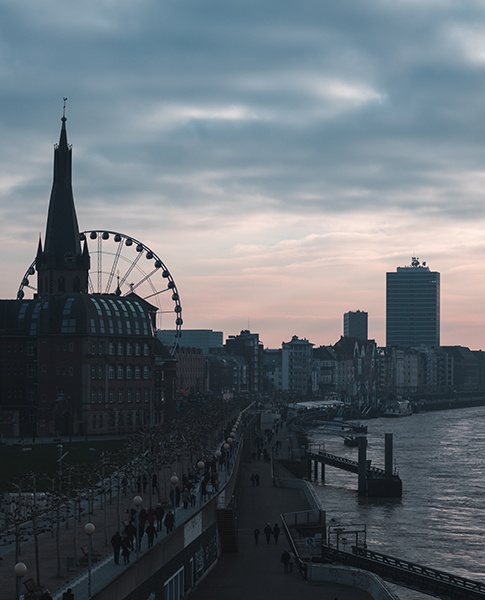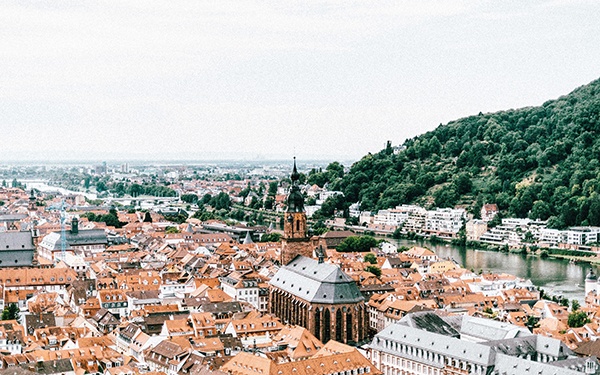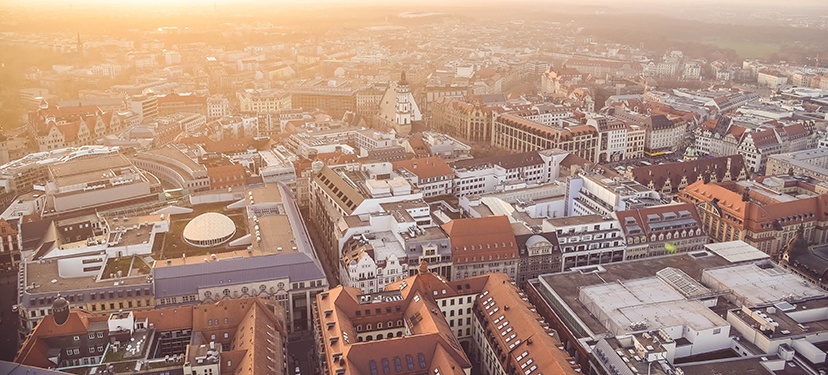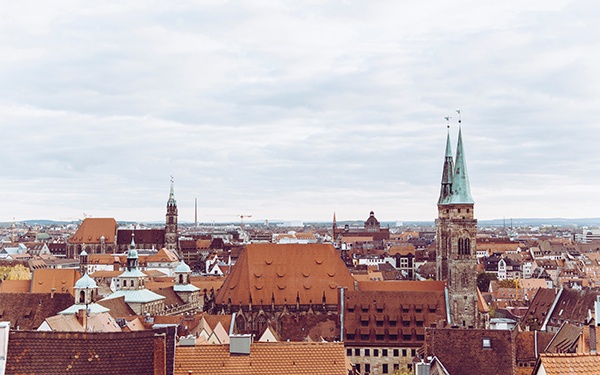Considering moving to Germany? Check out our guide to the best cities for British expats.
Germany has long been enticing British expats with attractive pay packages, fantastic life/work balance, excellent schools and family friendly lifestyle, good career prospects and job security, plus magnificent natural spaces, rich culture, and historic sites.
But with so many locations in Germany to choose from, which ones offer the most to Brits?
Read on to discover the best cities in Germany for British expats…
Berlin
The political and cultural hub of Germany, Berlin has long been in a state of flux.
The history of the city is one of destruction and creation, and Berlin has risen from the flames like a phoenix.
An influx of major business and people flocking to visit the city from around the world has transformed the city one of the most unique and interesting places in Europe today.
It’s constantly evolving and reinventing itself which gives it a distinctive style all of its own. Berlin isn’t meant to be seen, it’s meant to be experienced.
Steeped in history and with a vibrant culture, Berlin is bursting with things to see and do. With flat, clean streets, huge green urban spaces, and respectful motorists Berlin is perfect for cycling, and although the city has a fantastic public transportation system, exploring Berlin by bike is the best (and most fun) way to take in the different neighbourhoods.
And there’s so much to explore including museums, music and street art, fabulous markets, funky boutiques selling new and upcoming European trends, and a wealth of outstanding restaurants.
Berlin also boasts some of the most exciting nightlife in the world, with countless bars, hip nightclubs, and live music venues. Berliners like to to stay out late, so be prepared to party until dawn.
The Berlin attitude is laid back, and there’s a friendly, welcoming vibe, and entrance fees and drinks are reasonably priced.
And it’s not just entertainment that is affordable. Berlin is one of the cheapest European capitals overall. Rents are cheaper than in many other German cities, and are around 23% cheaper than London, with a spacious 120 square foot apartment in a nice area costing around 1500 euros per month.
When eating out you can save or splurge as you choose, but eating well doesn’t have to be expensive, and groceries are very affordable if you are on a tight budget.
There is also a thriving expat community here – about a third of people living in Berlin come from a non-German background, and nearly everybody speaks English — and Berliners are known for being liberal and accepting which makes it easy to integrate.
Brits also stand a very good chance of finding employment here, plus the dynamic nature of the city makes it an excellent place for entrepreneurial expats to start their own businesses, or being self employed.
Cologne

Poised on Germany’s western fringes, the beautiful and affordable city of Cologne offers a whole host of reasons to visit, and numerous reasons to stay.
Impressive gothic architecture can be seen everywhere in the city — crowned by the magnificent twin spired cathedral which dominates the skyline.
Flowing through the heart of the city, the majestic Rhine river splits Cologne in two geographically, but in fact acts as a major pulsing artery with residential neighbourhoods springing up on the left banks, as well as restaurants, bars, and shops galore, and on the right side there are vast parks and gardens to explore, as well as more alternative hangouts.
If art, history and culture is your thing, you will find myriad museums, galleries, medieval churches and more in Cologne.
Foodies can indulge themselves in one of the multitude of fantastic restaurants to be found featuring delicacies from all over the globe, and trying out the traditional, hearty kölsche cuisine with beer is an experience not to be missed.
Cologne benefits from a fast growing economy, giving rise to good career possibilities for British expats, particularly those skilled in vehicle manufacturing, mechanical engineering, nanotechnology, logistics, media and communications.
There is already a well established expat community here with more than 30% of the city’s population being foreigners, and English is widely spoken, so UK expats normally find it relatively easy to make friends and fit in.
Living in the city can be quite affordable too, as rental prices are significantly cheaper than in London, and restaurant prices, groceries, transport and utility bills are also lower. Groceries for a week for one person shouldn’t cost more than around 50 euros, and eating out can be done on a budget, as there are plenty of inexpensive street food options.
Cologne also puts on plenty of free public events throughout the year, so all you need to do is add your new friends and you’re good to go!
Frankfurt

Expats adore the multi-cultural, multi-lingual melting pot that is Frankfurt.
Nearly half the population is made up of non-natives, and this open minded, global city offers an exceptionally high standard of living — particularly for families.
The international schools are excellent, the expat communities are active and vibrant, and this economic powerhouse of a city has plenty of scope for ambitious British expats to blossom.
Frankfurt is also extremely well connected. Not only does it have an exceptional public transport system within the city, it also has Germany’s largest airport with flights operating daily to other German cities and the rest of Europe within easy reach.
Salaries are high here, however taxes are in line with the bigger pay packets, and the cost of living here is fairly high compared to elsewhere in Germany. Accommodation is in high demand and can also come at a premium, in addition to long waiting lists.
Frankfurt’s futuristic skyline is almost iconic, and its financial district pumps the city with wealth. It’s in stark contrast to the city’s historical attractions, medieval architecture, cathedrals and churches, yet somehow the city marries the two effortlessly.
The river Main runs through the city centre, and has given rise to the nickname ‘Main-hatten’, which quite rightly draws comparisons between this cosmopolitan metropolis and the famous Manhattan New York. As you would imagine this multi-cultural city is diverse in cuisine, art, and things to do and see.
The city’s cider houses are famous, the museums are top notch, and there are plenty of lush parks where you can happily dream away an afternoon.
Munich

Home to the biggest beer festival in the world, thousands flock here each year, but there’s much more to the Bavarian capital than booze.
Munich is located on the river Isar only a short distance from the Alps and the southeast German border, so is conveniently placed for either exploring the mountains or hopping to Austria, Switzerland or the Czech Republic for a weekend break.
Munich is particularly popular with families, and is currently experiencing something of a baby boom. The population here is made up of people from all over Germany and large numbers of foreigners — including plenty of Brits — and is steadily growing.
There are active expat communities and international groups here providing plenty of opportunities to meet new people if you’re new to the city.
Munich successfully combines traditional and modern. Spend your time in vast beer halls with lederhosen-clad staff and live brass music, hit the pristine streets indulging in world class shopping, dine in elegant restaurants or chill in a chic jazz bar, appreciate some excellent urban art, or simply soak up the atmosphere and enjoy hanging out with the cheerful locals.
Being such a popular city with so much to offer has seriously bumped up prices in Munich, and it is Germany’s most expensive city.
Rental accommodation is in high demand and comes at a premium, so expect even a room in a shared apartment to cost around 500 euros per month, and a two-bedroom apartment ranges from 1500 to 1800 euros per month – rent is the biggest expense for expats living here.
However public transport is efficient and affordable compared to UK prices, groceries, utilities, eating out or drinking in bars, and entertainments are similarly priced, but for many the high quality of life in Munich is well worth the higher living costs.
Hamburg

Recently ranked by Mercer as one of the best cities in the world for quality of life for expats, Hamburg has strong UK connections having been occupied by British troops during the Second World War and a vibrant UK expat community.
Hamburg is big on culture — be it music, art, theatre, or museums — and it’s a haven for art and music lovers, housing some of the biggest arts devoted spaces in Europe.
Expats here commonly find work in artistic fields here, such as music, media such as internet, television, film, and radio, as well as software and IT, and due to the fact that Hamburg has Germany’s biggest port, careers in shipping, import and export are also common.
The bustling international port has also brought great wealth to the city, as well as a population made up of a diverse melange of cultures and ethnic backgrounds — although not everyone here speaks English so it’s a good idea to learn at least some German.
Nightlife in Hamburg is fabulous, and each neighbourhood has its own unique appeal. Depending on what you desire you can choose from stylish cocktail bars, hipster hangouts, cosy pubs, all night clubs, or even seedy strip joints. Restaurants offer up a smorgasbord of gastronomic delights.
Hamburg is one of the more expensive cities in Germany to live, but depending on your level of extravagance it is still possible to live here fairly reasonably. There are plenty of free activities available to keeps costs down, and there are cheap and tasty places to eat.
Rent is the highest monthly outgoing for expats — it averages €650 per month for a 1 bedroom apartment in the centre of the city — and utilities cost around 200 euros a month on average. Fresh groceries from markets are very affordable, as is public transport.
To put into an overall perspective, living in Hamburg is around 27% cheaper than London.
Dusseldorf

Once a small collection of villages on the banks of the Rhine, Dusseldorf has grown up and blossomed to become a bright cosmopolitan city boasting innovative architecture mixed with art nouveau, a cutting edge art and fashion scene, pulsating nightlife, some of Germany’s finest shopping, and a friendly, provincial feel.
The elegant city centre has been beautifully remodelled and features a top notch infrastructure. The various different neighbourhoods each have their own appeal; some with large student and foreigner populations, others with antique markets, unusual boutiques, offbeat cafés and restaurants, art museums and galleries.
Dusseldorf is also home to the longest bar in the world — The Altstadt — and eclectic nightlife from the underground hipster scene to swish nightclubs.
A major business and financial hub, with a dynamic labour market including thousands of foreign companies, Dusseldorf also attracts many expats with excellent job prospects.
Highly acclaimed international schools offer an excellent education for expats kids, and the city is very well suited to families, with plenty of kid friendly activities and places to visit.
However, although not the most expensive city in Germany, Dusseldorf is not cheap, either. That said it’s possible to get decent, fairly reasonably priced accommodation, from around 600 euros upwards for a studio apartment, with larger apartments in the city centre starting at about 1200 euros per month.
Food and drink won’t cost you any more than in any other major European city, and the beer is cheap!
Heidelburg

Could Heidelburg be the most beautiful city in Germany? It certainly occupies an enviable position in a lush, green forested valley surrounded by mountains in a stunning riverside setting — all surveilled by the imperial semi ruined castle on the hilltop.
The city is so lovely in fact, that it has been attracting and inspiring artists, poets, authors and composers since the 18th century.
The Old Town is all cobbled streets and old world charm, and incorporates Germany’s oldest university which was established in 1386.
The Neckar river and the picturesque vineyards and parks are ideal for strolling, and the city has won awards for nature preservation and protection of the environment.
There are some fine museums, theatres and galleries, and concerts and creative events are held throughout the year.
Summer is the perfect time to enjoy Heidelberg’s relaxed café culture and get people watching.
Surprisingly Heidelberg is not one of the most expensive cities in Germany, and the cost of living is generally around 27% cheaper when compared to London living costs.
Leipzig

Quirky, cool, scintillating, creative — these are just some of the words that could be used to describe Leipzig.
Never afraid to be different, this small and friendly city is fast becoming a hotspot to rival Berlin, and attracts a young, hip crowd, as well as music lovers who appreciate Leipzig’s connections to musical greats: Mendelssohn, Bach, and Wagner.
This is a place of promise, of new opportunities, and increasingly numbers of entrepreneurs are setting up businesses here — particularly those working in creative fields — and the city is positively booming.
It’s a great place to party too (particularly if you like techno as it plays a big part in Leipzig’s music scene), and there’s no enforced closing time for pubs and restaurants so things can get pretty wild until very late.
What’s more the cost of living is fairly low here. There are plenty of affordable rental accommodations, and eating out, groceries, and drinks are all significantly cheaper than London, but the quality of living is very high, making Leipzig an exciting choice for expats.
Nuremburg

Bavaria’s second biggest city next to Munich, Nuremberg was once the main residence of German royalty, and the incredible old town boasts medieval half timbered houses, glorious churches, and the imposing Kaiserburg — a once mighty castle which dominated the Nuremberg skyline.
In more recent history the city was hijacked by the Nazi regime during the Second World War as the seat of their propaganda, and as a result was mostly reduced to rubble by the allied forces to be used later as the location for the infamous eponymous war trials.
These days, Nuremberg is an energetic city and major industrial, medical, and technology hub. The city centre is buzzing and there’s oodles to do, such as wandering the medieval markets and eating in rustic restaurants at Handwerkerhof, to boating on the lake, festivals an outdoor events, or sampling the local delicacies of gingerbread or the Nürnberger Rostbratwurst sausage.
Nuremberg is smaller, cosier, and cheaper than Munich, so if you prefer a more provincial feel and better value for money, Nuremberg is the better choice.
It’s also quieter and with a less expansive range of career options, but is does have undeniable charm in bucketloads.
Which do you think is the best German city for British expats?





